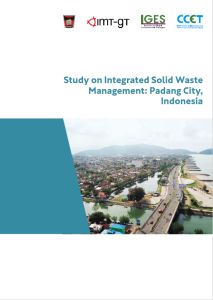One emerging issue in Padang City, Indonesia is waste management. In addition to a rise in population, modern lifestyles and tourism development have resulted in burgeoning waste generation, as well as more littering and burning of waste. This problem has exceeded the waste management capacity of the city. Consequently, the Batang Arau river, one of the most important rivers in Padang, has become polluted with litter. Furthermore, the life of the final disposal site (TPA) is getting shorter, due to uncontrolled amounts of collected mixed waste being transported there. The city needed a feasible and sustainable plan of action to improve its waste management capacity.
At the request of the city through IMT-GT, IGES Centre Collaborating with UNEP on Environmental Technologies (CCET) with the support of the United Nations Environment Programme - International Environmental Technology Centre (UNEP-IETC) and the Ministry of Environment in Japan (MoEJ) established an agreement with Padang city to provide support in developing a city action plan for integrated solid waste management. As a first step, situation analysis was conducted to capture the current waste management status and capacity from various aspects.
This report “Study on Integrated Solid Waste Management: Padang City, Indonesia” is the outcome of committed team effort led by the Mayor with Environmental Agency (DLH) of Padang city with inputs from from various stakeholders including academic institutions, private sectors, non-governmental organisations (NGOs), community groups, and civil society organisations (CSOs). It provides scientific and up-to-date data and local knowledge to understand the waste flow, waste generation and composition, waste management operation of key stakeholders in terms of available resources and partnerships, and awareness and waste handling habits of local populations. It also helps Padang city develop an integrated city action plan and take transformative actions to solve environmental pollution through improved waste management.

